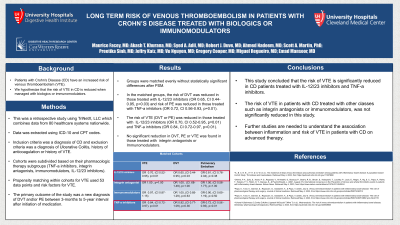Monday Poster Session
Category: IBD
P2161 - Long Term Risk of Venous Thromboembolism in Patients With Crohn's Disease Treated With Biologics or Immunomodulators
Monday, October 23, 2023
10:30 AM - 4:15 PM PT
Location: Exhibit Hall

Has Audio

Maurice Facey, MD
University Hospitals Cleveland Medical Center
Cleveland, OH
Presenting Author(s)
Maurice Facey, MD1, Akash Khurana, MD2, Syed Adil, MD1, Ahmed Nadeem, MD3, Scott Martin, PhD1, Preetika Sinh, MD4, Jeffry Katz, MD5, Vu Nguyen, MD5, Gregory Cooper, MD5, Miguel Regueiro, MD6, Emad Mansoor, MD7
1University Hospitals Cleveland Medical Center, Cleveland, OH; 2Case Western Reserve University, University Hospitals, Cleveland, OH; 3Cleveland Clinic, Cleveland, OH; 4Medical College of Wisconsin, Milwaukee, WI; 5Case Western Reserve/UHCMC, Cleveland, OH; 6Cleveland Clinic Lerner College of Medicine, Case Western Reserve University, Cleveland, OH; 7Case Western Reserve University / University Hospitals, Cleveland, OH
Introduction: Patients with Crohn’s Disease (CD) have an increased risk of venous thromboembolism (VTE), including deep vein thrombosis (DVT) and pulmonary embolism (PE). The pathogenesis of this association is thought to be multi-factorial and may be related to active gastrointestinal inflammation. We sought to evaluate the risk of incident VTE in CD in patients on biologics or immunomodulators.
Methods: We used a large health research network with data from 80 health care organizations, within the United States (TriNetX). Patients were included if they had CD (ICD-10 K50) and excluded if they had Ulcerative Colitis (ICD-10 K51), history of anticoagulant use, or history of VTE. Patients were divided into cohorts based on each specific sub-class of therapy (TNF inhibitors (TNFi), integrin antagonists, immunomodulators, IL-12/23 inhibitors) used in the treatment of CD and compared to those with CD not on these therapies. Within each cohort, we collected data on demographics, VTE risk factors as well as disease phenotypes (Table 1) and performed propensity score matching (PSM) to control for confounding. Primary outcome was new diagnoses of DVT and/or PE between 3 months to 5 years after starting a medication for CD. Odds ratio (OR) and 95% confidence interval (CI) were used to report associations for the propensity-matched cohorts.
Results: There were 123,167 patients with CD on biologics or immunomodulators: Anti-TNFs (n=51,811), Integrin receptor antagonists (n=11,659), IL-12/23 inhibitors (n=9,202) and Immunomodulators (n= 50,495) before PSM. After PSM, the groups were evenly matched without any statistically significant differences. Compared to patients with CD not on these therapies, the risk of DVT was significantly reduced in those treated with IL-12/23 inhibitors (OR 0.65, CI 0.44-0.95, p=0.03) and risk of PE was significantly reduced in those treated with TNF inhibitors (OR 0.72, CI 0.56-0.93, p=0.01). Aggregate risk of VTE (DVT or PE) was significantly reduced in those treated with IL-12/23 inhibitors (OR 0.70, CI 0.52-0.95, p=0.01) and TNF inhibitors (OR 0.84, CI 0.72-0.97, p=0.01). There were no significant differences in rates of DVT, PE or VTE for those treated with integrin antagonists and immunomodulators.
Discussion: The risk of VTE is significantly reduced in patients with CD treated with IL-12/23 inhibitors and TNF inhibitors. This supports the concept that control of inflammation reduces the VTE risk and that biologics and immunomodulators are not associated with DVT and PE.
Disclosures:
Maurice Facey, MD1, Akash Khurana, MD2, Syed Adil, MD1, Ahmed Nadeem, MD3, Scott Martin, PhD1, Preetika Sinh, MD4, Jeffry Katz, MD5, Vu Nguyen, MD5, Gregory Cooper, MD5, Miguel Regueiro, MD6, Emad Mansoor, MD7. P2161 - Long Term Risk of Venous Thromboembolism in Patients With Crohn's Disease Treated With Biologics or Immunomodulators, ACG 2023 Annual Scientific Meeting Abstracts. Vancouver, BC, Canada: American College of Gastroenterology.
1University Hospitals Cleveland Medical Center, Cleveland, OH; 2Case Western Reserve University, University Hospitals, Cleveland, OH; 3Cleveland Clinic, Cleveland, OH; 4Medical College of Wisconsin, Milwaukee, WI; 5Case Western Reserve/UHCMC, Cleveland, OH; 6Cleveland Clinic Lerner College of Medicine, Case Western Reserve University, Cleveland, OH; 7Case Western Reserve University / University Hospitals, Cleveland, OH
Introduction: Patients with Crohn’s Disease (CD) have an increased risk of venous thromboembolism (VTE), including deep vein thrombosis (DVT) and pulmonary embolism (PE). The pathogenesis of this association is thought to be multi-factorial and may be related to active gastrointestinal inflammation. We sought to evaluate the risk of incident VTE in CD in patients on biologics or immunomodulators.
Methods: We used a large health research network with data from 80 health care organizations, within the United States (TriNetX). Patients were included if they had CD (ICD-10 K50) and excluded if they had Ulcerative Colitis (ICD-10 K51), history of anticoagulant use, or history of VTE. Patients were divided into cohorts based on each specific sub-class of therapy (TNF inhibitors (TNFi), integrin antagonists, immunomodulators, IL-12/23 inhibitors) used in the treatment of CD and compared to those with CD not on these therapies. Within each cohort, we collected data on demographics, VTE risk factors as well as disease phenotypes (Table 1) and performed propensity score matching (PSM) to control for confounding. Primary outcome was new diagnoses of DVT and/or PE between 3 months to 5 years after starting a medication for CD. Odds ratio (OR) and 95% confidence interval (CI) were used to report associations for the propensity-matched cohorts.
Results: There were 123,167 patients with CD on biologics or immunomodulators: Anti-TNFs (n=51,811), Integrin receptor antagonists (n=11,659), IL-12/23 inhibitors (n=9,202) and Immunomodulators (n= 50,495) before PSM. After PSM, the groups were evenly matched without any statistically significant differences. Compared to patients with CD not on these therapies, the risk of DVT was significantly reduced in those treated with IL-12/23 inhibitors (OR 0.65, CI 0.44-0.95, p=0.03) and risk of PE was significantly reduced in those treated with TNF inhibitors (OR 0.72, CI 0.56-0.93, p=0.01). Aggregate risk of VTE (DVT or PE) was significantly reduced in those treated with IL-12/23 inhibitors (OR 0.70, CI 0.52-0.95, p=0.01) and TNF inhibitors (OR 0.84, CI 0.72-0.97, p=0.01). There were no significant differences in rates of DVT, PE or VTE for those treated with integrin antagonists and immunomodulators.
Discussion: The risk of VTE is significantly reduced in patients with CD treated with IL-12/23 inhibitors and TNF inhibitors. This supports the concept that control of inflammation reduces the VTE risk and that biologics and immunomodulators are not associated with DVT and PE.
Disclosures:
Maurice Facey indicated no relevant financial relationships.
Akash Khurana indicated no relevant financial relationships.
Syed Adil indicated no relevant financial relationships.
Ahmed Nadeem indicated no relevant financial relationships.
Scott Martin indicated no relevant financial relationships.
Preetika Sinh indicated no relevant financial relationships.
Jeffry Katz: Janssen, Pharmaceuticals – Grant/Research Support.
Vu Nguyen: AbbVie – Consultant, Speakers Bureau. Bristol Myers Squibb – Advisory Committee/Board Member.
Gregory Cooper indicated no relevant financial relationships.
Miguel Regueiro: AbbVie – Advisory Committee/Board Member, Consultant, Unrestricted educational grants. Alfasigma – Advisory Committee/Board Member, Consultant. Allergan – Advisory Committee/Board Member, Consultant. Amgen – Advisory Committee/Board Member, Consultant. Bristol Myers Squibb – Advisory Committee/Board Member, Consultant, Unrestricted educational grants. Celgene – Advisory Committee/Board Member, Consultant, Unrestricted educational grants. Eli Lilly – Advisory Committee/Board Member, Consultant. Genentech – Advisory Committee/Board Member, Consultant, Unrestricted educational grants. Gilead Sciences – Advisory Committee/Board Member, Consultant, Unrestricted educational grants. Janssen – Advisory Committee/Board Member, Consultant, Unrestricted educational grants. Miraca Labs – Advisory Committee/Board Member, Consultant. Pfizer Inc – Advisory Committee/Board Member, Consultant, Unrestricted educational grants. Prometheus – Advisory Committee/Board Member, Consultant. Salix – Advisory Committee/Board Member, Consultant. Seres – Advisory Committee/Board Member, Consultant. Takeda – Advisory Committee/Board Member, Consultant, Unrestricted educational grants. Target RWE – Advisory Committee/Board Member, Consultant. UCB – Advisory Committee/Board Member, Consultant, Unrestricted educational grants. Wolters Kluwer Health – Royalties.
Emad Mansoor indicated no relevant financial relationships.
Maurice Facey, MD1, Akash Khurana, MD2, Syed Adil, MD1, Ahmed Nadeem, MD3, Scott Martin, PhD1, Preetika Sinh, MD4, Jeffry Katz, MD5, Vu Nguyen, MD5, Gregory Cooper, MD5, Miguel Regueiro, MD6, Emad Mansoor, MD7. P2161 - Long Term Risk of Venous Thromboembolism in Patients With Crohn's Disease Treated With Biologics or Immunomodulators, ACG 2023 Annual Scientific Meeting Abstracts. Vancouver, BC, Canada: American College of Gastroenterology.
